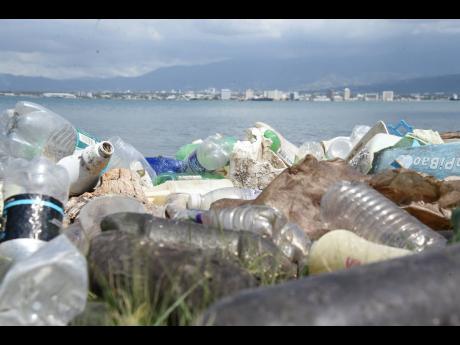Kathleen Rogers | Plastics: It’s personal
The battle against plastics began decades ago. In the early days, the focus was on the proliferation of plastic pollution and its impact on land use. The battle shifted in the 1980s, with local skirmishes against single-use plastics that created movements to push recycling and, more recently, how to ban plastics at the state and country levels. With the myth of plastic recycling discredited, the public is finally beginning to understand that this is not simply a “waste management” problem.
Now, plastics have become personal.
Although knowing for decades that plastics caused endocrine disruption, it was the discovery that plastics broke down into micro plastic particles and leached toxic plastic related chemicals that changed everything. They enter our bodies from the air, our food, water, and even from our clothing and it is this knowledge that jump started millions of dollars in research. Scientists are rushing to determine the role that plastics play in every disease from Alzheimer’s to cancer. Photos from a recent study show microplastics stuck in artery plaque], creating further blockages for Americans over 60 years of age, who have plaque in their arteries. More disturbing is another study showing100 per cent of placentas tested had microplastics.
PROOF
Is there proof that plastic is hurting us? While scientists hate committing to 100 per cent certainty, the answer is likely yes. Plastic is made from oil, and all plastics contain at least two to three different chemicals and heavy metals – it’s what makes it usable. Many of those chemicals – bisphenol A, phthalates, brominated flame retardants – are among the Environmental Protection Agency’s “priority pollutants”, but almost none of them are banned outright; the rest of plastics’ chemicals are “confidential business information”.
As plastics break down over time into microplastics, they act as magnets for heavy metals, many of which are known carcinogens, as well as harbouring viruses. Making microplastics doubly harmful, in essence a “forever chemical,” carrying other “forever chemicals” and all likely to last for a thousand years.
Of course we have heard this all before.
Environmental and health history is replete with stunning examples of industries that have been engaged in long-term purposeful deception, tricking us all into believing that their products are safe. Since the 1950s, the tobacco industry knew that their products were both addictive and caused cancer, but, in order to deceive the public and government, they created complex and confusing disinformation campaigns. With the help of whistleblowers and others, the industry was finally nabbed in a civil racketeering case for marketing and selling “their lethal products with zeal, with deception”.
BURNING FOSSIL FUELS
Exxon was aware that burning fossil fuels would create climate change at least as early as the 1970s and, taking a page from the tobacco playbook, spent decades and millions of dollars “manufacturing doubt” led by scientists, mathematicians, and others on their payroll. The oil industries’ tactics delayed worldwide action that could cost hundreds of millions of people their lives, and they are still doing it.
Syngenta, one of the world’s largest chemical companies, spent years and untold millions secretly undermining researchers’ studies into their top weed-killer product that contains paraquat, which is now known to cause neurological changes like Parkinson’s.
The petrochemical and plastics industries, throughout these past four-plus decades, have plotted and defrauded the public and governments, “normalising” the idea that their products could be recycled when they knew they could not. Given industries’ long history of lying to us about recycling, it is fair to demand what else they are hiding.
Despite recent efforts to rid ourselves of plastic pollution, the oil industry’s intention is to move their stranded fossil fuels into plastics over the coming years. Global plastic production is expected to triple over the next 15 years, which will in turn massively increase the plastic industry’s deadly contribution to greenhouse gases, and will be worth close to a trillion dollars by 2030. The health risks to humans will increase, possibly eclipsing the number of deaths caused by climate change.
If history is our prophet, it is also likely that these industries already know some of the human health impacts, and have for decades. It is why EARTHDAY.ORG and a growing worldwide coalition of other NGOs and experts are calling on the plastics industry to tell us what they know. It’s also why the New York Times recently reported on plastic industry lawyers predicting a wave of lawsuits concerning “forever chemicals” which will impact many plastic-industry companies. EARTHDAY.ORG has been calling for these companies to be held liable for what we know they have almost certainly known for a long time about the risks caused by plastics.
It is at our peril – and theirs – if they continue to hide and ignore the health and environmental harms caused by plastics – be it the microplastic particles and fibres or the toxic chemicals used to make plastics in the first place. The history of corporate deceit when it comes to environmental and health harms is well known. While it is standard practice for industry to wait until the evidence mounts up while dragging their feet to continue to reap profits, the health impacts from plastics are already impacting all of us. This isn’t a future threat; it exists now. and we need to know what they know.
Kathleen Rogers is president of EARTHDAY.ORG, whose 2024 theme, ‘Planet vs. Plastics’, is part of its campaign to end plastics which was launched in 2018 and includes the most recent report on Babies and Plastics. This article previously appeared in ‘The Hill’. Send feedback to columns@gleanerjm.com


